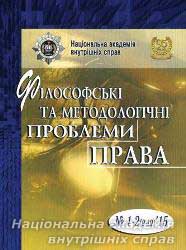Epistemological Foundations of the Scene Search During Receiving Information about Intentional Destruction or Property Damage
Keywords:
epistemology, review of the crime scene, intentional destruction or damage of property, explosion, arson, investigator, investigative (detective) actions
Abstract
The article is devoted to organizational and tactical basis of the inspection of the crime scene in obtaining information on destruction or damage of property. Epistemological principles of specific investigative (detective) actions are defined and appropriate actions of the investigator᾽s algorithm consisting investigative group, are analyzed. In particular, the author found that one reason for the unsatisfactory situation in the fight against crimes of this type, is to review the specific features of the site, identifying, recording and extracting evidence, involving relevant experts to carry out this investigation (investigative) actions. Persons who are investigating criminal offenses have difficulty already in the inspection of the site at a fixed signs and trace features picture. This leads to the need for re-examination, which often occurs when necessary traces irrevocably lost. Analysis of the current practices of law enforcement agencies in the investigation of crimes under art. 194 of the Criminal Code of Ukraine shows that the surveys still allowed methodological errors, especially broken criminologists recommended sequence of actions that must be performed on the spot in sequence. One of the circumstances that make it difficult to review the event is the fact that it did not involve staff of expert institutions with specialized knowledge. Review not carried out immediately, resulted in significantly reduced its effectiveness. Fewer participants investigative team, a great view of the complexity of the scene does not promote quality of his conduct. Noted that the investigator review of the epistemological point of view, made with complex cognitive methods, procedures and techniques. Acts as dominant scientific methods of cognition as observation. This method combined with other such methods, measurement, comparison, description and, if necessary, with the experiment, but the results of their use implemented in the review process differently. Inspection of the scene in obtaining information about a fire, explosion has its own characteristics that require special investigator training, skill, thoroughness in work. Its success depends not only on knowledge and mental abilities investigator of the professional level of specialists, but also on the ability of the investigator to organize collaboration and exchange of information of all persons involved in this investigation (search) action.Downloads
Download data is not yet available.
Abstract views: 137 PDF Downloads: 365
Issue
Section
Philosophical problems of particular branches of law studies
Copyright (c) 2017 Philosophical and Methodological Problems of Law

This work is licensed under a Creative Commons Attribution-NonCommercial-NoDerivatives 4.0 International License.
- Authors reserve the right to authorship of their own work and transfer to the magazine the right of the first publication of this work under the terms of the Creative Commons Attribution License, which allows other persons to freely distribute published work with mandatory reference to authors of the original work and the first publication of an article in this magazine.
- Authors have the right to enter into separate additional agreements on non-exclusive dissemination of the work in the form in which it was published in the journal (for example, to post an article in the institution's repository or to publish as part of a monograph), provided that the link to the first publication of the work in this journal is maintained.
- The journal's policy allows and encourages the posting of articles by authors on the Internet (for example, in electronic storehouses of institutions or on personal websites), both before the submission of this manuscript to the editorial office and during its editorial processing, as this contributes to the creation of a productive scientific discussion and positively affects the efficiency and dynamics of citing the published work.




